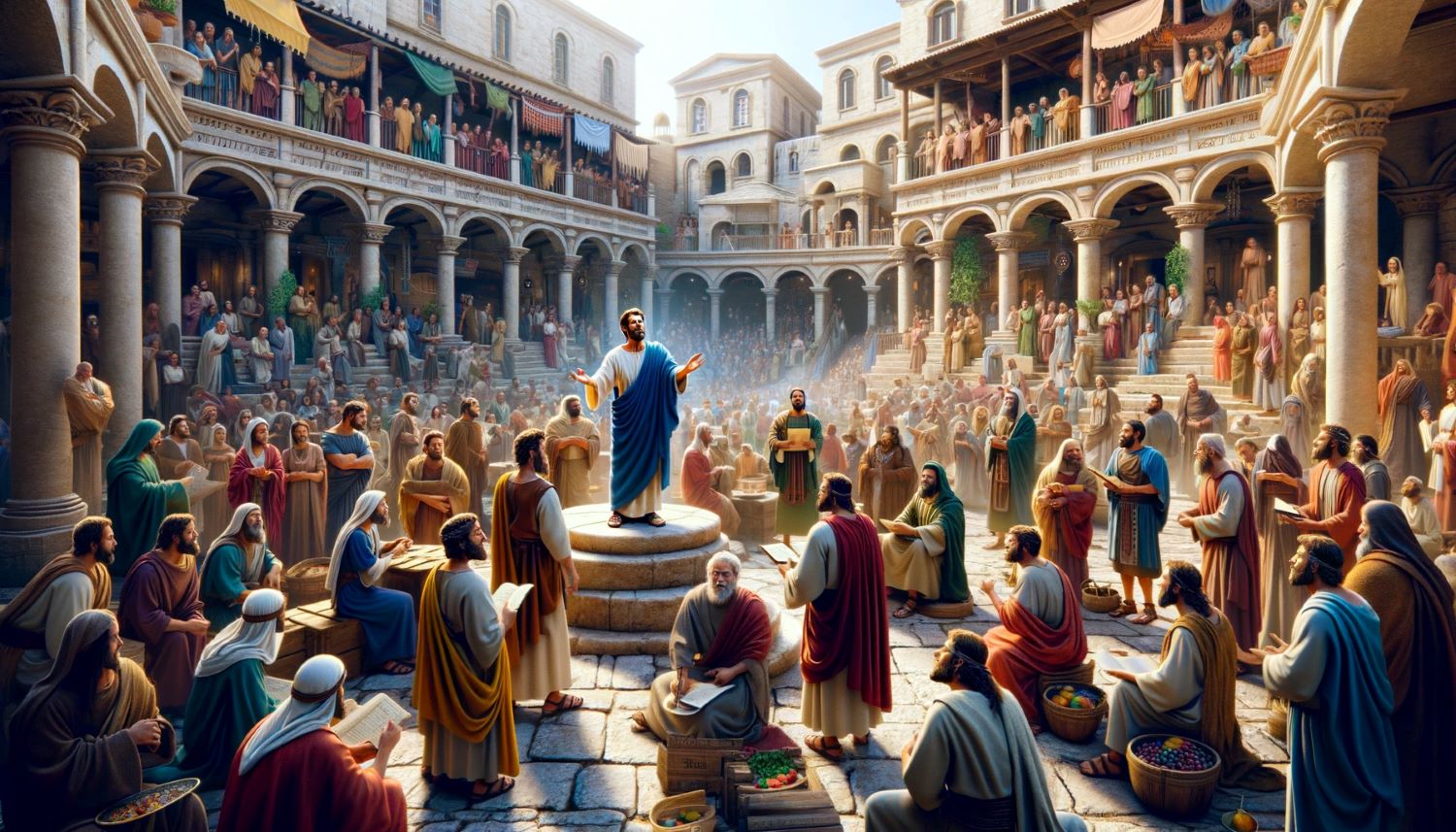Home>Bible Facts>Where Did The 12 Apostles Go?


Bible Facts
Where Did The 12 Apostles Go?
Published: February 19, 2024
Ericka Andersen, an editor at Christian.net, expertly merges digital strategy with content creation, focusing on faith and societal issues. Her communication skills enhance the platform's engaging narratives, fostering meaningful dialogue on belief's impact on society.
Discover the fascinating truth about the whereabouts of the 12 apostles and explore intriguing Bible facts in this insightful article. Uncover the mysteries of biblical history today!
(Many of the links in this article redirect to a specific reviewed product. Your purchase of these products through affiliate links helps to generate commission for Christian.net, at no extra cost. Learn more)
Table of Contents
Introduction
The 12 Apostles, also known as the Twelve Disciples, were a group of individuals chosen by Jesus Christ to accompany him during his ministry on Earth. These individuals played a pivotal role in spreading the teachings of Christianity and establishing the early Christian church. Their names are synonymous with the foundation of the Christian faith, and their actions have left an indelible mark on the course of history.
The lives of the 12 Apostles are shrouded in mystery and intrigue, and their ultimate fate has been the subject of much speculation and debate. While the New Testament provides accounts of their activities during Jesus' lifetime, the details of what transpired after his crucifixion and resurrection are less clear. This has led to a myriad of theories and legends surrounding the whereabouts and destinies of these influential figures.
As we delve into the lives and legacies of the 12 Apostles, we will explore the historical narratives, as well as the various theories and legends that have emerged over the centuries. By examining the evidence and accounts available to us, we can gain a deeper understanding of the paths taken by these enigmatic individuals and the impact they had on the spread of Christianity.
The disappearance of the 12 Apostles has sparked curiosity and fascination for generations, prompting historians, theologians, and enthusiasts alike to seek answers to the question: Where did the 12 Apostles go? Through an exploration of their lives, the events following Jesus' resurrection, and the historical records that have survived the test of time, we aim to shed light on the enduring mystery surrounding the fate of the 12 Apostles.
Read more: Where Did The Apostles Go To
The Life and Ministry of the 12 Apostles
The 12 Apostles were a diverse group of individuals who played integral roles in the life and ministry of Jesus Christ. Chosen by Jesus himself, each Apostle brought unique qualities and experiences to the table, contributing to the rich tapestry of the early Christian movement.
-
The Chosen Twelve: According to the New Testament, Jesus handpicked his 12 Apostles from various walks of life, including fishermen, a tax collector, and a zealot. This eclectic mix of backgrounds reflected the inclusive nature of Jesus' ministry, transcending societal boundaries and embracing individuals from all walks of life.
-
Witnesses to Miracles and Teachings: Throughout their time with Jesus, the Apostles bore witness to his profound teachings and miraculous acts. They were present for the Sermon on the Mount, the feeding of the 5,000, and numerous other transformative moments that shaped their understanding of Jesus' divine nature and the message he sought to impart.
-
Commissioned for Ministry: Jesus not only taught the Apostles but also empowered them to carry forth his message. They were given the authority to heal the sick, cast out demons, and proclaim the arrival of the kingdom of God. This commissioning marked a pivotal moment in the Apostles' journey, as they transitioned from followers to messengers of the gospel.
-
The Last Supper and Betrayal: The poignant events leading up to Jesus' crucifixion deeply impacted the Apostles. The Last Supper, where Jesus foretold his betrayal and instituted the sacrament of communion, underscored the profound bond between the Apostles and their teacher. Judas Iscariot's betrayal and subsequent death further tested the resolve of the remaining 11 Apostles.
-
Resurrection and Great Commission: Following Jesus' resurrection, the Apostles encountered their risen Lord, solidifying their faith and igniting a renewed sense of purpose. Jesus charged them with the Great Commission, instructing them to go and make disciples of all nations, baptizing them in the name of the Father, Son, and Holy Spirit.
The lives of the 12 Apostles were intertwined with the transformative ministry of Jesus Christ. Their experiences, teachings, and eventual dispersion across the known world laid the groundwork for the global spread of Christianity. The impact of their collective efforts continues to resonate through the annals of history, shaping the faith of millions and inspiring generations to come.
The Disappearance of the 12 Apostles
Following the monumental events of Jesus' resurrection and the subsequent outpouring of the Holy Spirit at Pentecost, the lives of the 12 Apostles took divergent paths, ultimately leading to their enigmatic disappearances from the historical record. The New Testament provides limited accounts of their activities after the initial spread of Christianity, leaving ample room for speculation and conjecture regarding their ultimate fates.
The Apostles' post-Pentecost endeavors were marked by zealous missionary work, as they ventured into various regions to proclaim the gospel message. However, historical documentation regarding their specific movements and activities becomes increasingly scarce as time progresses. The dispersion of the Apostles to distant lands and the absence of comprehensive historical records have contributed to the mystery surrounding their disappearances.
As the early Christian community faced persecution and upheaval, the individual journeys of the Apostles became increasingly obscured. While some accounts and traditions offer insights into their potential destinations and martyrdoms, the precise details remain elusive. The lack of concrete historical evidence has given rise to a tapestry of legends and theories, each seeking to unravel the enigma of the Apostles' disappearances.
The Apostles' vanishing from the historical narrative has fueled enduring intrigue and speculation, prompting the emergence of diverse narratives and traditions that seek to shed light on their final endeavors. The veil of uncertainty surrounding their fates has sparked fascination and curiosity, inspiring countless explorations and inquiries into the paths taken by these influential figures.
The disappearance of the 12 Apostles stands as a testament to the enduring allure of their legacies and the profound impact of their contributions to the early Christian movement. While the specifics of their ultimate fates may remain shrouded in mystery, their enduring influence continues to resonate through the annals of history, inspiring contemplation and reflection on the enduring legacy of the 12 Apostles.
Theories and Legends Surrounding the Fate of the 12 Apostles
The enigmatic disappearances of the 12 Apostles have given rise to a rich tapestry of theories and legends, each offering unique perspectives on the potential fates of these influential figures. As historical records become increasingly scarce, the realm of speculation and tradition has flourished, yielding a diverse array of narratives that seek to illuminate the paths taken by the Apostles following their missionary endeavors.
One prevalent theory revolves around the notion of martyrdom, suggesting that many of the Apostles met their ends through persecution and violent opposition to their teachings. Accounts and traditions from various regions depict harrowing tales of their steadfast commitment to spreading the gospel, often culminating in their martyrdoms. These narratives serve as testaments to the unwavering dedication of the Apostles and the immense sacrifices they made in the face of adversity.
Intriguingly, legends and traditions have emerged linking the Apostles to far-flung regions and distant lands, fueling speculation about their potential travels and missionary activities. From the shores of India to the expanses of Ethiopia, stories abound regarding the Apostles' purported ventures into uncharted territories, where they fervently preached the message of Christianity. These accounts, while steeped in folklore, offer compelling glimpses into the enduring impact of the Apostles' missionary zeal and the profound reach of their influence.
Furthermore, certain traditions and apocryphal texts have given rise to captivating narratives surrounding the miraculous exploits and supernatural encounters attributed to the Apostles. These accounts depict the Apostles as agents of divine intervention, performing extraordinary feats and engaging in spiritual battles against malevolent forces. Such legends serve to underscore the enduring reverence and awe inspired by the Apostles' perceived connection to the divine realm, transcending the boundaries of conventional historical narratives.
The enduring allure of these theories and legends lies in their capacity to capture the imagination and evoke a sense of wonder regarding the fates of the 12 Apostles. While the veracity of these accounts may remain a subject of debate, their enduring resonance speaks to the profound impact of the Apostles' legacies and the enduring fascination surrounding their enigmatic disappearances.
Historical Accounts and Evidence of the 12 Apostles' Whereabouts
The quest to uncover the historical accounts and evidence of the 12 Apostles' whereabouts has captivated scholars, historians, and enthusiasts for centuries. While the available historical records offer glimpses into the early spread of Christianity, piecing together the individual trajectories of the Apostles has proven to be a complex and enigmatic endeavor.
The New Testament provides valuable insights into the activities of several Apostles, particularly Peter and Paul, whose missionary journeys and interactions with early Christian communities are documented to some extent. The Acts of the Apostles, attributed to the authorship of Luke, offers a window into the early propagation of the Christian faith, shedding light on the challenges and triumphs encountered by the Apostles as they ventured into diverse regions.
Additionally, ancient texts and traditions from various geographical locations have contributed to the mosaic of historical accounts surrounding the Apostles' potential destinations and endeavors. These sources, often steeped in legend and folklore, offer tantalizing glimpses into the perceived movements and legacies of the Apostles following their initial missionary activities.
Archaeological discoveries have also yielded valuable clues regarding the potential presence of the Apostles in certain regions. Notable excavations and historical research have unearthed artifacts and inscriptions that hint at the early dissemination of Christian beliefs, providing indirect evidence of the Apostles' influence in specific locales.
Furthermore, the writings of early Church fathers and theologians, such as Eusebius of Caesarea and Origen, offer valuable perspectives on the activities and eventual fates of the Apostles. These historical accounts, while subject to interpretation and scholarly scrutiny, contribute to the ongoing dialogue surrounding the trajectories of the Apostles beyond the canonical narratives.
The enduring challenge lies in reconciling the diverse historical accounts, traditions, and archaeological findings to construct a cohesive understanding of the Apostles' post-Pentecost endeavors. While the available evidence offers tantalizing glimpses into their potential movements and impact, the precise details of their individual journeys remain veiled in the mists of time, perpetuating the enduring mystery of the 12 Apostles' disappearances.
In the absence of definitive historical clarity, the quest to unravel the enigma of the Apostles' whereabouts continues to inspire scholarly inquiry and contemplation, underscoring the enduring fascination and significance of their enduring legacy.
Read more: Where Did Apostles Creed Come From
Conclusion
The enduring mystery surrounding the fate of the 12 Apostles continues to captivate the imagination and curiosity of individuals across the globe. As we have journeyed through the lives, ministries, and enigmatic disappearances of these influential figures, a tapestry of narratives, theories, and historical accounts has emerged, each contributing to the enduring allure of their legacies.
The lives of the 12 Apostles were intertwined with the transformative ministry of Jesus Christ, as they bore witness to his teachings, miracles, and ultimate sacrifice. Commissioned to spread the gospel message to the ends of the earth, the Apostles embarked on zealous missionary endeavors, venturing into diverse regions to proclaim the message of Christianity. However, the historical record becomes increasingly elusive as we seek to trace their individual trajectories beyond the initial spread of the faith.
Theories and legends surrounding the fate of the Apostles have flourished, offering diverse perspectives on their potential destinations and endeavors. From accounts of martyrdom and persecution to tales of far-flung missionary journeys, these narratives reflect the enduring impact of the Apostles' missionary zeal and the profound reach of their influence. While steeped in folklore and tradition, these accounts serve as testaments to the enduring resonance of the Apostles' legacies and the enduring fascination surrounding their enigmatic disappearances.
Historical accounts, ancient texts, and archaeological findings have provided tantalizing glimpses into the potential movements and impact of the Apostles following the initial spread of Christianity. The Acts of the Apostles, writings of early Church fathers, and archaeological discoveries offer valuable insights into the early propagation of the Christian faith and the potential presence of the Apostles in specific locales. However, the precise details of their individual journeys remain veiled in the mists of time, perpetuating the enduring mystery of the 12 Apostles' disappearances.
In conclusion, the quest to unravel the enigma of the Apostles' whereabouts continues to inspire scholarly inquiry and contemplation, underscoring the enduring fascination and significance of their enduring legacy. While the specifics of their ultimate fates may remain shrouded in mystery, the enduring influence of the 12 Apostles continues to resonate through the annals of history, inspiring contemplation and reflection on the profound impact of their contributions to the early Christian movement.














